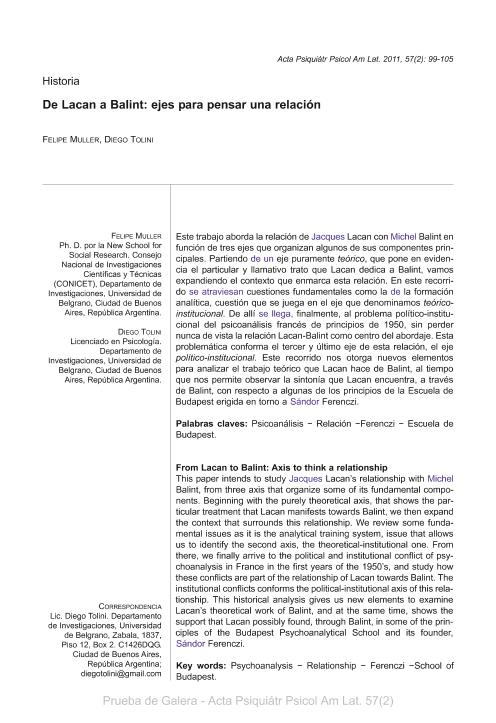Mostrar el registro sencillo del ítem
dc.contributor.author
Muller, Felipe Juan

dc.contributor.author
Tolini, Diego

dc.date.available
2023-04-04T18:42:55Z
dc.date.issued
2011-06
dc.identifier.citation
Muller, Felipe Juan; Tolini, Diego; De Lacan a Balint: ejes para pensar la relación; Fundación Acta Fondo para la Salud Mental; Acta Psiquiátrica y Psicológica de América Latina; 57; 2; 6-2011; 99-105
dc.identifier.issn
0001-6896
dc.identifier.uri
http://hdl.handle.net/11336/192755
dc.description.abstract
este trabajo aborda la relación de Jacques Lacan con Michel Balint en función de tres ejes que organizan algunos de sus componentes principales. partiendo de un eje puramente teórico, que pone en evidencia el particular y llamativo trato que Lacan dedica a Balint, vamos expandiendo el contexto que enmarca esta relación. en este recorrido se atraviesan cuestiones fundamentales como la de la formación analítica, cuestión que se juega en el eje que denominamos teóricoinstitucional. de allí se llega, finalmente, al problema político-institucional del psicoanálisis francés de principios de 1950, sin perder nunca de vista la relación Lacan-Balint como centro del abordaje. esta problemática conforma el tercer y último eje de esta relación, el eje político-institucional. este recorrido nos otorga nuevos elementos para analizar el trabajo teórico que Lacan hace de Balint, al tiempo que nos permite observar la sintonía que Lacan encuentra, a través de Balint, con respecto a algunas de los principios de la escuela de Budapest erigida en torno a sándor Ferenczi.
dc.description.abstract
This paper intends to study Jacques Lacan’s relationship with Michel Balint, from three axis that organize some of its fundamental components. Beginning with the purely theoretical axis, that shows the particular treatment that Lacan manifests towards Balint, we then expand the context that surrounds this relationship. We review some fundamental issues as it is the analytical training system, issue that allows us to identify the second axis, the theoretical-institutional one. From there, we finally arrive to the political and institutional conflict of psychoanalysis in France in the first years of the 1950’s, and study how these conflicts are part of the relationship of Lacan towards Balint. The institutional conflicts conforms the political-institutional axis of this relationship. This historical analysis gives us new elements to examine Lacan’s theoretical work of Balint, and at the same time, shows the support that Lacan possibly found, through Balint, in some of the principles of the Budapest psychoanalytical school and its founder, sándor Ferenczi.
dc.format
application/pdf
dc.language.iso
spa
dc.publisher
Fundación Acta Fondo para la Salud Mental

dc.rights
info:eu-repo/semantics/openAccess
dc.rights.uri
https://creativecommons.org/licenses/by-nc-sa/2.5/ar/
dc.subject
Lacan
dc.subject
Balint
dc.subject
Escuela de Budapest
dc.subject
Psicoanálisis
dc.subject.classification
Otras Psicología

dc.subject.classification
Psicología

dc.subject.classification
CIENCIAS SOCIALES

dc.title
De Lacan a Balint: ejes para pensar la relación
dc.title
From Lacan to Balint: Axis to think a relationship
dc.type
info:eu-repo/semantics/article
dc.type
info:ar-repo/semantics/artículo
dc.type
info:eu-repo/semantics/publishedVersion
dc.date.updated
2023-04-03T12:09:37Z
dc.identifier.eissn
2362-3829
dc.journal.volume
57
dc.journal.number
2
dc.journal.pagination
99-105
dc.journal.pais
Argentina

dc.journal.ciudad
Ciudad Autónoma de Buenos Aires
dc.description.fil
Fil: Muller, Felipe Juan. Universidad de Belgrano. Departamento de Investigaciones; Argentina. Consejo Nacional de Investigaciones Científicas y Técnicas; Argentina
dc.description.fil
Fil: Tolini, Diego. Universidad de Belgrano. Departamento de Investigaciones; Argentina. Consejo Nacional de Investigaciones Científicas y Técnicas; Argentina
dc.journal.title
Acta Psiquiátrica y Psicológica de América Latina

dc.relation.alternativeid
info:eu-repo/semantics/altIdentifier/url/http://www.acta.org.ar/04-WebForms/frmResumen.aspx?IdArticulo=77&Abonado=
Archivos asociados
